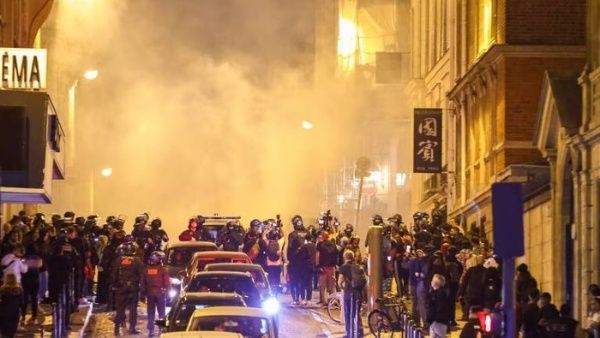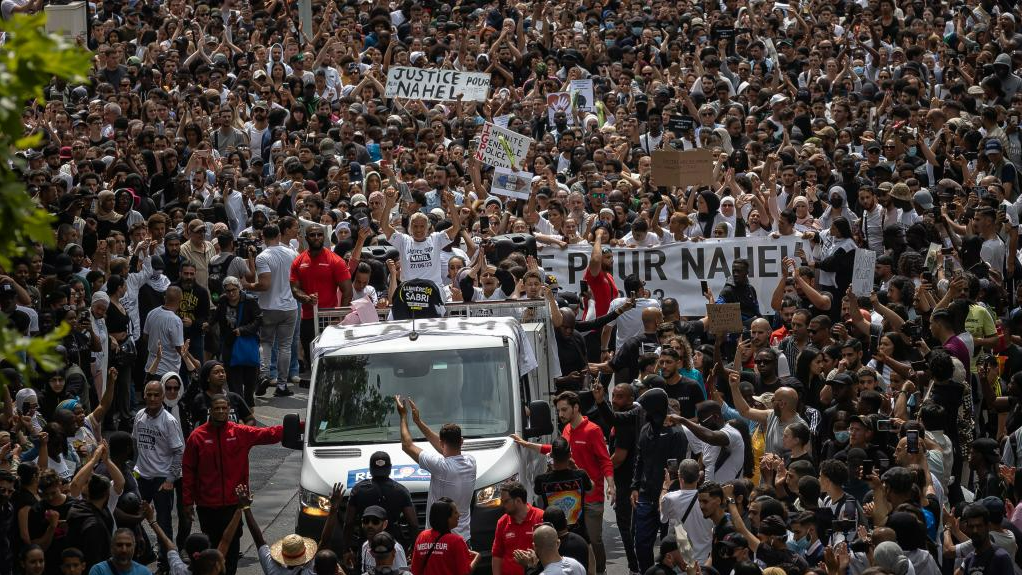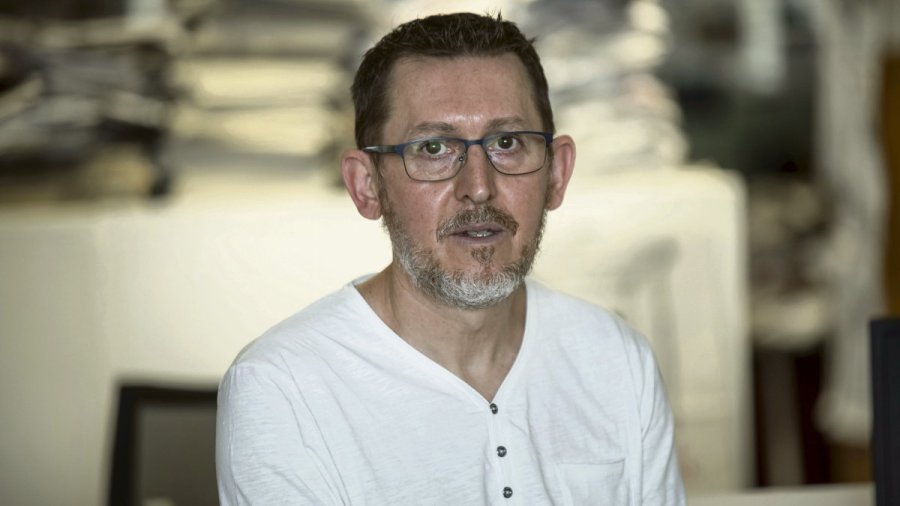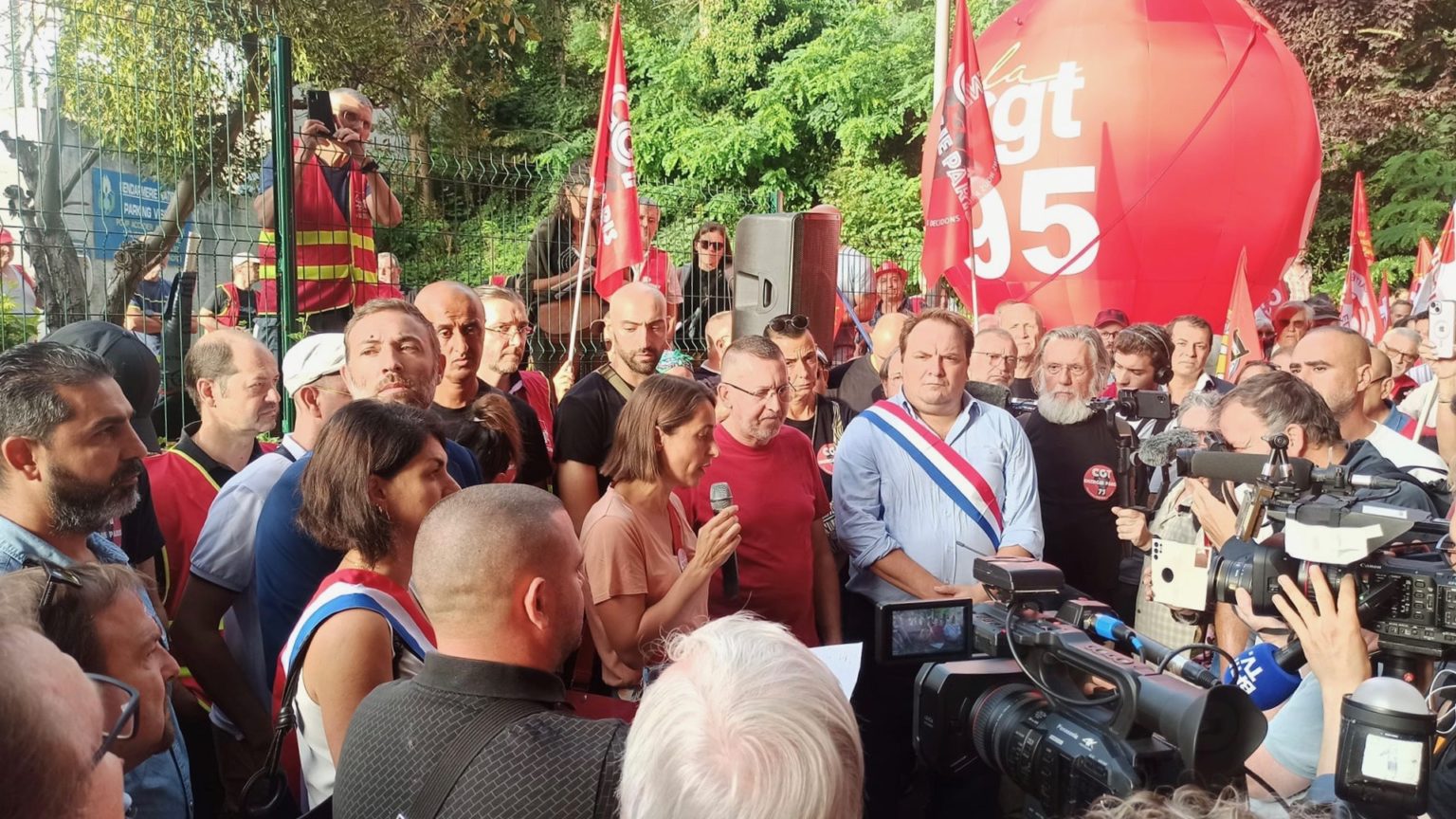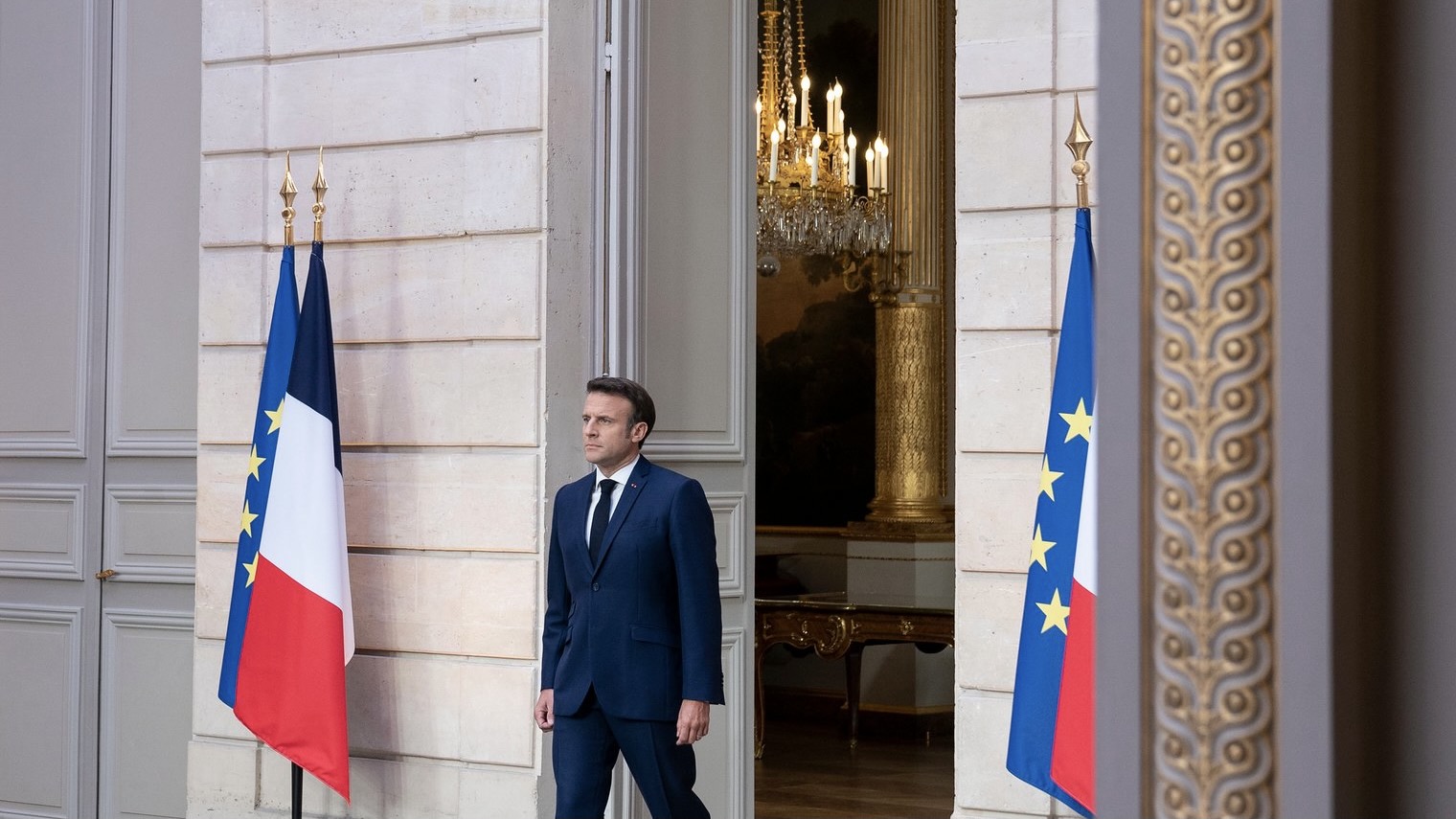July 4, 2023 Struggle - La Lucha

The fourth day of disturbances in France leaves more than 1,300 detainees.
Following the death of Nahel, a 17-year-old boy, shot point-blank by a police officer during a traffic control in Nanterre (Hauts-de-Seine) on the 27th, riots broke out in popular neighborhoods throughout France, which burns again (as in 2005), expressing its rage against police violence, racist discrimination and the relegation perpetuated by the political and media powers.
By the way, we share two visions of this event, published by the political analysis magazine Viento Sur.
The first is an interview by Faïza Zerouala with the sociologist Michel Kokoreff, a university professor in Paris VIII and a specialist in poor neighborhoods and their relationship with the police. He discusses the riots that followed the young man’s death.
***

Violence broke out in France due to the death of a young man shot by a police officer for whom the justice decreed preventive detention.
The sociologist Michel Kokoreff, a university professor in Paris VIII and author of Sociologie des émeutes (Payot, 2008) and La Diagonale de la rage (Divergences, 2022), talks to Mediapart about the three nights of riots that followed the death of Nahel in Nanterre. For him, who worked on the 2005 riots and the broken promises [of the government], the riots and the anger in popular neighborhoods, given the socioeconomic conditions of their inhabitants, the tense relations with the police and racism, it is legitimate.
In his opinion, the only possible way out of this crisis is to reverse the article of the 2017 law that facilitates and legitimizes the use of firearms by the police, even if it means offending the increasingly powerful police unions.
Mediapart : After these three nights of revolt, the parallels with the autumn of 2005 seem evident. Do you think it is relevant?
Michel Kokoreff: Collective amnesia surprises me. Yes, the social history of riots repeats itself. Since the 1970s, all urban riots in France, up until 2018 in Nantes, have followed the same pattern. That is, a black or Arab youth dies as a result of a violent interaction with a police officer.
The resulting collective emotion leads to riots, scenes of violence and clashes with the police. The White Marches [a call for peaceful demonstrations] called for calm, but the riots have continued for several days fueled by police repression and inflammatory statements and authoritarian and contemptuous gestures by the Minister of the Interior.
In 2005, the riots lasted for almost three weeks. At that time, Prime Minister Dominique de Villepin reactivated the 1955 state of emergency, which had been used during the Algerian war. With the return of law and order, the promises of solutions and the deghettoization of the neighborhoods disappeared.
On this occasion, we have not yet reached that point, although the situation in many popular neighborhoods has inflamed since the day Nahel was killed and during the following nights. I am inclined to establish the connection with the live agony of George Floyd, in 2019. The video of the shooting of the motorized police officer and his colleague in Nanterre shows police abuse similar to that seen in Minneapolis.
Often the evidence [about police abuse] is difficult to establish, but not in this case. Hence, undoubtedly, the low profile that the authorities have maintained, the denunciation of politicians (with the exception of Marine Le Pen) and popular athletes and artists. But in 2005, the rioters were on their own…
What continuity do you see in the triggering factors of these riots of the last three nights with respect to the previous ones?
The same causes produce the same effects. Social problems remain the same and accumulate. Poverty, unemployment, job insecurity, school failure and school dropout are structural causes to which ethno-racial causes are superimposed, with that feeling of exclusion that accompanies it, racism, Islamophobia, discrimination of all type, in particular the discriminatory controls known as au faciès [by the color of the skin].
The feeling of discrimination, together with the difficulty of finding a stable job, is fueled by the logic of ghettoization that the urban renewal policy has not been able to break.
And then there are the political causes, namely the fact that urban politics, which for a long time was a very complex hodgepodge, has been completely abandoned since François Hollande, with Macron’s burial of the Borloo report.
Among the more circumstantial causes, we can cite the 2017 law, which I will not go into detail about, which is a Pandora’s box to the extent that it broadens the conditions for the use of weapons by police officers, so that the number of shootings for refusing to abide by it has doubled and that since 2020 it has caused double the number of deaths than the average observed in the 2010s, as recorded by the online magazine Basta!
Lastly, another factor is the extreme right-wing of power.
What does this mean?
It must be said that in France we are in a fascist moment. Without going back to the 2016-2023 sequence, this can be measured by the political positioning of the police unions. After World War II, they were close to the Communist Party, in the 1980s to the Socialist Party, and today to the Rassemblement National [extreme right], or sometimes worse. The reactions of [police unions] Alliance and France Police, who applaud Nahel’s death, are despicable. At the same time, they show the extent to which public security and the police are co-managed by the majority unions as well as by the Ministry of the Interior. They did not express themselves like that in 2005, and the pressure of these unions, their pressure in the face of the 2017 law, was much weaker.
Now social networks are used massively in these cases. Does this change the situation and the way these events are perceived?
In 2005, we were still in the 20th century. We are now in the 21st century, in the era of the digital revolution and counter-communication. During [the mobilizations of] Nuit debut [2016] and the yellow vests, social networks were used a lot. Smartphones were heavily filmed and used to provide a counter-narrative to police violence, to show what the continuous disinformation televisions were obviously not showing.
The youth of the popular neighborhoods are not far behind and use this tactic to zbeul [create disorder] and impose a counter-narrative. The ludic motivations of this violence are not the only ones at stake. A teenager died brutally (it could have been any other young person), hence the anger that erupted against the armed wing of the State, which condenses all forms of domination. This reminds us that riots always have political significance. It’s not just about looking good, it’s about showing the anger and uprising of the people who, if necessary, use fireworks to assert their point of view, with a novelty: firing mortars.
Didn’t this kind of reaction exist in 2005 or 2007 in Villiers-le-Bel?
It may be anecdotal, but it did not exist in 2005, just as it did not exist in the demonstrations. In Villiers-le-Bel, in 2007, pellet guns emerged, but that was really very exceptional. But here, the mortar fire creates an atmosphere of tension: apart from being very visual and creating viral images, it’s a kind of response to the overarming of law enforcement that the BRI [anti-gang brigade] sends in. Basically, it’s a form of resistance inspired by the Hong Kong uprisings. And it is through social networks that the mobilizations are taking place.
In various neighborhoods, town halls, schools, media libraries and social centers have been targeted, with the recurring controversy of the destruction of public services that benefit local residents. Why is this rhetoric so prevalent and what response can be given to it?
The youth of popular neighborhoods attack public services because, along with the police, they are the only trace of state power. Destroying them is an answer, even if it is part of a self-destructive logic that can be understood. How else can you make yourself heard? Historically, in France we do not like the use of political violence because it seems to us necessarily illegitimate. But in South Africa, in the United States, it was violence that set things in motion, not to mention the yellow vests , even if they didn’t achieve much.
The point of riots is that they clear things up, make problems publicly visible. In 2007, Nicolas Sarkozy did not name his diversity ministers by chance. [Those riots] They also shed light on the divorce of the left with the popular neighborhoods, which he had abandoned.
In 2005, the inhabitants of the popular neighborhoods felt very lonely. Today, in the context of the repression directed against the Soulèvements de la Terre and environmental activists considered eco-terrorists , is it possible to link the two and change the situation?
Yes, there is an immediate echo between one form of repression and the other; even on Tuesday night at the Place de la République in Paris, at the rally in support of the Soulèvements de la Terre, several speakers expressed their solidarity, not only with the Nahel family, but also pointing out the systemic link between violence of the state in both cases.
But it must be said that this echo is not enough. A complicated relationship – perhaps a class and race relationship – continues to exist between the activists of the intellectual petty bourgeoisie and the inhabitants, who may also be activists, of the popular and racialized neighborhoods.
The former are unaware of the suburbs’ colonial and immigration history, which makes it difficult to cross the border between the two. And this despite the fear, since May 1968, of those in power that the peasants, workers and students will cooperate, and that this diagonal of rage will lead to the appearance of a class front . Although in practice this solidarity is hard to get going and make it last, it can help move the lines against an inflexible government.
Without risking risky forecasts, can this revolt last? How to get out of the crisis?
By dint of talking about conflagration, we are playing with fire; It is what we call self-fulfilling prophecies. In reality, political responses will be decisive. Is the executive going to let the situation fester to legitimize his command speech or is he going to crack down? Three examples have been mentioned: that the case of Nahel’s murder is not tried in the nearest court, as requested by the family’s lawyers; another key issue is reversing the 2017 law that broadens and obscures the conditions for the use of firearms by police officers. Finally, for years there have been calls for the creation of an external and independent police oversight body that is not judge and party like the current Inspectorate General of the National Police (IGPN). One only has to see what our neighboring [countries] are doing. But in the current political climate,
***
A new case of deadly police violence has rocked the country. In such situations, the authorities usually prefer to dispute the veracity of the facts. This time, a video showing the circumstances of Nahel’s death and the uproar it caused could not be ignored. A new barrier was erected to protect the police from criticism: the violent act in question could be explained by an individual fault of the police officer who fired the shot and his colleague.
More critical voices point to a change in the law that regulates the use of firearms and the lack of police training as fundamental causes. As explained by Paul Rocher, author of the book Que fait la police? (published by La Fabrique), the current debate fails to capture the underlying causes of police violence and racism that lie at the very heart of the police force.
Nahel’s death tragically reopens the debate about people killed by police officers in the context of what the police narrative presents as a refusal to respect the police order. Compiling data from the Ministry of the Interior, a team of journalists from Bastamag were able to show that “police officers have killed four times as many people for refusing to obey orders in five years as in the previous twenty.”
Therefore, it seems appropriate to ask why this impressive and relatively recent increase in shootings has occurred. Approximately 5 years ago, in March 2017, a new law on internal security made the use of weapons by police officers more flexible. The text authorizes police officers and gendarmes to use their weapons if they fail to immobilize a vehicle “whose drivers do not comply with the order to stop and whose occupants may perpetrate, in their flight, an attack on their life or physical integrity or other people’s.”
The wording of this law is notoriously vague: how can a police officer reasonably know a driver’s intentions? And it is in this vagueness that the problem lies. A team of researchers has studied the effects of this fuzzy contour law. As one of the study’s co-authors summarizes, “the law that allows police officers to shoot more often results in…they shooting more often, and the number of police homicides (monthly average) increases massively.” An internal security law that reduces public security would be almost comical if it did not have dramatic consequences.
The elephant in the room: institutional racism
By focusing on the rise in police shootings after a change in the law, you risk quietly overlooking a crucial aspect of the death of Nahel and so many others. Focusing on the shootings -as important as it is- tends to situate the debate on an a priori ground blind to the racial dimension of police violence. However, the victims of shootings are not usually white. Given this fact, the debate on the refusal to obey police orders is necessarily a debate on police racism, the existence of which has been solidly demonstrated. In 2009, a study highlighted and quantified what suburbanites had long known:
“Depending on who was looking at it, blacks were between 3.3 and 11.5 times more likely than whites to be stopped by the police” and Arabs “were between 1.8 and 14.8 times more likely than whites.” [1] .
Racial profiling is a reality. Ten years later, the conclusions are the same. In 2019, the French Ombudsman revealed the existence of “systemic discrimination that translates into the overrepresentation of certain immigrant populations and derogatory practices in conducting identity checks by the police” [2 ]. These systemic practices are so ingrained in the day-to-day running of the institution that police officers are not necessarily aware of it.
To clearly understand the scope of institutional racism, the work that the great British sociologist Stuart Hall wrote specifically to understand the riots in British working-class neighborhoods after police intervention is instructive:
“First, institutional racism does not need overtly racist individuals: racism is seen as the result of a social process. [Second, norms of racist behavior] are carried within the professional culture of an organization and transmitted from informally and implicitly through their routine, their daily practices as an indestructible part of the institutional habitus. Racism of this type becomes routine, a habit that is taken for granted. It is much more effective in the socialization practices of police officers than formal training and regulations.(…) It prevents the existence of a professional reflexivity.Far from being considered exceptional, this type of involuntary racism is becoming part and parcel of the very definition of normal police work ” [3] .
In other words, the institution’s commonly accepted definition of good policing involves acting on the assumption that a non-white person is a suspect.
The existence of this attitude is confirmed by a series of studies on the French case spanning several decades. In 2017, the work of sociologist Christian Mouhanna reached a very similar conclusion to that of his colleague René Lévy in 1987, who stated that racial categorizations “constitute, so to speak, the tools of the trade and are part of that body of knowledge practices that constitute the background, the reference point of police work” [4] . This literature also shows that “police suspicion acts as a self-fulfilling prophecy, that is, it helps produce what is expected and thus confirms police officers in their belief in the relevance of these categories” [5 ] .
The power to categorize the population, which the investigation highlights, in turn shapes the use of force. The police is the only body that is recognized as having the capacity to determine what is understood by public order and its opposite, disorder, justifying the use of coercive methods: the use of a lethal or non-lethal weapon, or the mobilization of other restraint practices [6] . Sociologist Ralph Jessen points out that the primary criterion for a police officer’s intervention is his assessment of a situation; therefore, laws and regulations are only of secondary importance, and law enforcement often have only partial knowledge of them [7] .
By now, the scope of the 2017 law is becoming clearer. By expanding the scope of the use of weapons based on the individual judgment of the police officer, immersed himself in a professional environment steeped in racist prejudices, this law especially exposes the non-white part of the population. But it is also clear that the debate cannot focus solely on the use of firearms, since police violence is not limited to them.
Another series of statistics compiled by Bastamag journalists shows that of the 676 people killed as a result of police action between 1977 and 2019, only 60% were shot. What’s more, the magnitude of police violence goes well beyond the most extreme case of deadly violence.
An institution that transforms officers
Although institutional racism is a well-established fact in scientific research, if we want to fully understand police violence, we must take into account another specific feature of the police, namely that it is characterized by an extraordinary degree of isolation from the outside world and a formidable degree of internal cohesion. Let us unravel this argument in two stages.
First of all, it turns out that the majority of people who decide to become police officers are characterized by a purely repressive conception of the profession [8] . Thus, the police do not attract a cross-section of society, but rather people who stand out for their taste for authoritarian media. After this initial stage of self-selection, police officers are further isolated from society by the institution itself. To understand this, it is useful to study professional socialization. It is a double process during which the candidate acquires the technical skills and knowledge of the profession, on the one hand, and absorbs the vision of society that prevails within the institution to which he is committed, on the other.
To clarify the vision that prevails within the police institution, we can use the terms of a scientific article according to which the policemen see themselves as living in a “besieged citadel”, which unites the group [9 ]. In other words, police officers feel under siege from the rest of society. The formation of an esprit de corps is therefore achieved through the construction of an enemy, and this process in turn encourages “excessively violent behavior that exceeds the limits of legitimate violence” [10 ]. Although the police force attracts very specific profiles, it is above all the police institution, during professional socialization, that generates officers who are very united internally and distrustful, or even hostile, towards society.
Once the inner workings of the police institution are brought to light, the argument that police violence can be explained by inadequate training, too short a training period and the lowering of the eligibility threshold for applicants to the police profession loses almost all his strength. Although these factors may play a marginal role, the problem does not reside mainly in those who access the institution, but in an institution that transforms the agents that work in it; an effect that, as Hall points out, deprives the institution of any self-reflexive capacity.
Thinking about the police institution also allows, without diluting the specificity of police racism, to understand that the increase in violence against the labor movement and the environmental movement in the spring of 2023 did not come exclusively from those who gave the orders to the government, but from the government itself. police apparatus. Even more so when one takes into account the unprecedented expansion of police forces in the last 30 years.
What does the police do? We show that, contrary to the widespread myth that the police, like the rest of the civil service, have suffered from austerity, in fact, they have experienced an unprecedented increase in resources during this period: +35% (much higher than the increase in resources allocated to education during the same period: 18%) [11] . The number of police officers has increased in similar proportions. The latest programming law of the Ministry of the Interior, approved at the end of 2022, plans to go even further, assigning almost 15,000 additional million in the next five years.
These developments indicate that the police are materially in a position to exercise unprecedented control over society. Among other things, this is reflected in more regular contact with the population, which is an opportunity to expose the prejudices that characterize the institution.
This helps explain why the uprisings that followed Nahel’s death were not limited to Nanterre. It also explains why an investigation into the shooter and his accomplice will not be able to eradicate the anger at the discrimination that has been experienced daily in the region for many, many years, and the pain of so many people, almost exclusively black or Arab. , who have suffered violence or have even lost a loved one.
(Taken from Viento Sur.)
Printed article from: Cubadebate: http://www.cubadebate.cu
https://www.struggle-la-lucha.org/2023/ ... he-revolt/
Death of Nahel Merzouk: Who sows violence?
July 4, 2023 Nancy Luc Śkaille

The brutal behavior of the French police only fuels the anger of the population.
July 3 – French President Emmanuel Macron canceled his state visit to Germany over the weekend because of one of the biggest crises of his tenure. Clashes between the population, which is tired of the ongoing police violence, and the 45,000 police officers who have been dispatched have shaped events since Tuesday after 17-year-old Nahel Merzouk was shot dead at close range by motorcycle policeman and ex-soldier Florian M. during a vehicle check in Nanterre. However, the reasons for the anger that broke out on these summer nights lie much deeper than the misconduct of a single police officer.
Hundreds of buildings – police stations, tax offices, town halls, schools, etc. – and thousands of vehicles burned. The rebellion spread across the country over the weekend and as far as Brussels, Belgium. The discourse of an “inexcusable act” that the state leadership is trying to create seems unbelievable because the past few months have been marked by excesses by the emergency services. The gunman M., who has since been arrested, pleaded self-defense until his lie was exposed.
Alongside social and racial segregation, police violence remains a problem that has never been seriously addressed, particularly in the outskirts of large cities. Unemployment and social cuts lead to weariness in the “banlieues” [impoverished suburbs], which is now turning into violence.
After just four nights, the authorities reported more than 2,000 arrests – as many as during the entire five-week uprising of 2005. At that time, the rebellions were triggered by the police-inflicted deaths of two youths in Clichy-sous-Bois. Meanwhile, the “anti-separatism law” of 2021 and a normalized state of emergency serve as the basis of police-state policy.
Since the relaxation of firearms legislation under Social Democrat François Hollande in 2017, deaths by police have skyrocketed, particularly during vehicle stops. At the time, Michel Tubiana of the LDH Human Rights League called the amendment a “license to kill.”
The UN has already condemned France’s authoritarian doctrine of order three times since May. According to official information, the deadly shot in Nanterre was the third fatal use of firearms by the emergency services since the beginning of the year. But the number of unreported cases is higher.
On June 14, patrol officers shot dead 19-year-old Guinean Alhoussein Camara during a vehicle stop in Angoulême. And the most recent riots are also claiming fatalities: A 54-year-old died on Thursday near Cayenne in French Guiana from a “ricochet.” That same evening, near Rouen, a youth fell to his death from the roof of a supermarket. A young man has been in mortal danger since Friday because of the use of firearms by the special unit RAID in Mont-Saint-Martin.
As in the previous crises of the Macron regime, from the “yellow vests” to the “pension reform” protests to the now-banned environmental campaign “Uprisings of the Earth,” state violence was preferred to dialogue. Typical of this are Macron’s trips around the country. For his visit to the violence-plagued Marseille suburb of Busserine on Monday last week, special units cordoned off the district and prohibited residents from leaving the blocks of flats.
Macron only tolerates cheers. In France, the police protect the state, not the population.
Translated by Melinda Butterfield
Source: Junge Welt
https://www.struggle-la-lucha.org/2023/ ... -violence/


